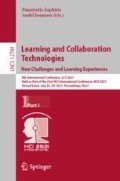Abstract
The disruption caused by the 2020 COVID-19 pandemic entailing a transfer to the fully online emergency remote teaching (ERT) put many teachers in Russia and across the globe in the role of facilitators, course designers, technical support specialists and psychologists. To address the new challenge, a group of instructors of St. Petersburg University of Information Technologies Mechanics and Optics (ITMO), Russia, attempted to adopt a blended ESL methodology piloted in 2017–2018 and calibrated in the intermittent period to build a Zoom- and LMS-based mostly synchronous upper-intermediate emergency remote General English course for 99 first and second year bachelor’s of science students (7 groups). To increase student satisfaction with the design and content of the course, learners’ needs were monitored during the fall 2020 semester through a series of surveys. To measure student satisfaction with the emergency ESL course, a summative cross-sectional survey, a series of semi-structured interviews and fall 2020 course completion rate were analyzed.
Access this chapter
Tax calculation will be finalised at checkout
Purchases are for personal use only
Notes
- 1.
For details see ITMO.education portal, https://edu.itmo.ru/ru/edu_online.
- 2.
Adrian Doff, Craig Thaine, Herbert Puchta, Jeff Stranks, Peter Lewis-Jones: Cambridge Upper-intermediate Empower Student’s Book, Cambridge University Press, Cambridge (2015), https://www.cambridge.org/gb/cambridgeenglish/catalog/adult-courses/cambridge-english-empower/cambridge-english-empower-upper-intermediate-students-book.
References
Grgurović, M., Chapelle, C., Shelley, M.: A meta-analysis of effectiveness studies on computer technology-supported language learning. ReCALL 25(2), 165–198 (2013). https://doi.org/10.1017/S0958344013000013
Saad Mohamed, A.F.: Feedback in Computer-Assisted Language Learning: A Meta-Analysis. TESL-EJ 24(2) (2020). http://www.tesl-ej.org/wordpress/issues/volume24/ej94/. Accessed 21 Jan 2021
Monje, E.M., Bárcena, E. (eds.): Language MOOCs: Providing Learning, Transcending Boundaries. De Gruyter, Warsaw/Berlin (2014). https://doi.org/10.2478/9783110420067
Polat, E.S. (ed.): Teorija i praktika distancionnogo obuchenija [Theory and Practice of Distance Learning]. Publishing house “Akademija”, Mocsow (2004). (in Russian)
Vaindorf-Sysoeva, M.E., Grjaznova, T.S., Shitova, V.A.: Metodika distancionnogo obuchenija: uchebnoe posobie dlja vuzov [Methodology of Distance Teaching: A Textbook for Institutions of HE]. Urait, Moscow (2019). (in Russian). https://urait.ru/bcode/433436
Hodges, Ch.B., Moore, S., Lockee, B.B., Trust, T., Bond, M.A.: The difference between emergency remote teaching and online learning. Educ. Rev. https://er.educause.edu/articles/2020/3/the-difference-between-emergency-remote-teaching-and-online-learning. Accessed 02 Feb 2021
Bailey, D.R., Lee, A.R.: Learning from experience in the midst of COVID-19: benefits, challenges, and strategies in online teaching. CALL-EJ 21(2), 178–198 (2020). http://callej.org/journal/21-2.html. Accessed 21 Jan 2021
Almazova, N., Krylova, E., Rubtsova, A., Odinokaya, M.: Challenges and opportunities for Russian higher education amid COVID-19: teachers’ perspective. Educ. Sci. 10, 1–11 (2020). https://doi.org/10.3390/educsci10120368
Pevneva, I., Edmunds, P.: Online learning vs. extreme learning in mining higher education under COVID. In: VTH International Innovative Mining Symposium, E3S Web of Conferences vol. 174, p. 04001, 6 p. (2020). https://doi.org/10.1051/e3sconf/202017404001
Windstein, E.V., Taylor, J.: Programming an English course: technology and interdisciplinary learning at a technical university. In: Nikulina, E.A., Belyaeva, E.E., Blokh, M.Ya., Fryedina, E.L., Kharitonova, I.V. (eds.) Proceedings of International Conference to 70-th Anniversary of Foreign Language Institute of Moscow State Teacher Training University. Part 3, pp. 91–99. Publishing house of MPGU, Moscow (2019). https://elibrary.ru/item.asp?id=37822472. Accessed 21 Jan 2021
Ausubel, D.P.: The Psychology of Meaningful Verbal Learning. Grune & Stratton, New York (1963)
Fraenkel, J., Wallen, N., Hyung, H.: How to Design and Evaluate Research in Education, 8th edn. McGraw-Hill, New York (2012)
Dörnyei, Z.: Motivational Strategies in the Language Classroom. Cambridge University Press, Cambridge (2001). https://doi.org/10.1017/CBO9780511667343
Thornberg, R., Charmaz, K.: Grounded theory and theoretical coding. In: Flick, U. (ed.) The SAGE Handbook of Qualitative Data Analysis, pp. 153–169. SAGE Publications Ltd., London (2014). https://doi.org/10.4135/9781446282243
Author information
Authors and Affiliations
Corresponding author
Editor information
Editors and Affiliations
Appendix 1
Appendix 1
Rights and permissions
Copyright information
© 2021 Springer Nature Switzerland AG
About this paper
Cite this paper
Windstein, E., Kogan, M. (2021). Rapid Response to the Needs of ESL Students of a Technical University in the Time of Emergency Covid-19 Transfer to Online Classes: ITMO University Case Study. In: Zaphiris, P., Ioannou, A. (eds) Learning and Collaboration Technologies: New Challenges and Learning Experiences. HCII 2021. Lecture Notes in Computer Science(), vol 12784. Springer, Cham. https://doi.org/10.1007/978-3-030-77889-7_38
Download citation
DOI: https://doi.org/10.1007/978-3-030-77889-7_38
Published:
Publisher Name: Springer, Cham
Print ISBN: 978-3-030-77888-0
Online ISBN: 978-3-030-77889-7
eBook Packages: Computer ScienceComputer Science (R0)

